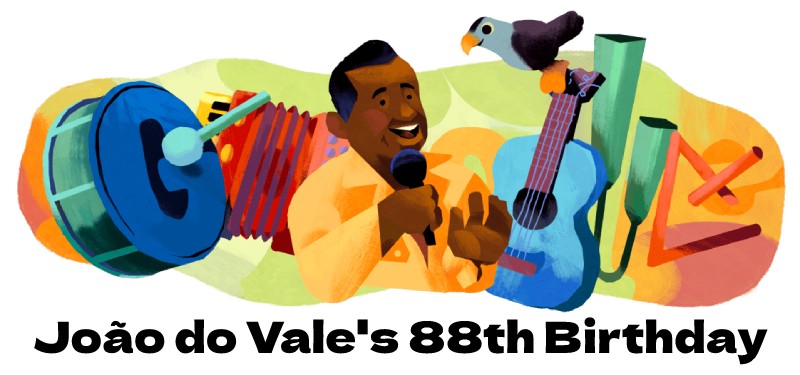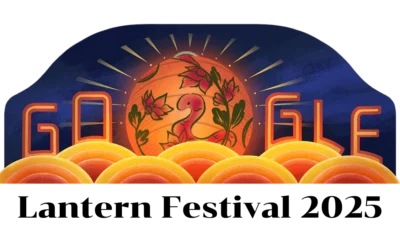News
Interesting Facts about João do Vale, a Brazilian musician

Search engine giant Google celebrates the 88th birthday of Brazilian musician, singer and songwriter João do Vale with a Google Doodle on October 11, 2022.
20 Interesting Facts about João do Vale
- João Batista do Vale, better known as João do Vale, was an Afro-Brazilian singer and composer who presented northeastern music styles with communities across Brazil. He’s recognized as a key figure in Brazil’s music scene.
- Vale was born in Pedreiras, Maranhão, in 1934. João Batista do Vale was very fond of music since he was little, yet soon had to work to help his loved ones.
- At 13 years old, he went to São Luís/MA, where he sold oranges on the street and partook in a group of Bumba-meu-boi, Linda Noite, as “amo” (in the popular culture of Maranhão, amo is the individual who organizes the group de Bumba meu boi, the singer, most of the time the owner of that group).
- After two years, João do Vale started his journey toward the south, taking a train to Teresina, and afterward consistently on truck rides: in Fortaleza CE, he was a truck helper; in Teófilo Otoni MG, he worked in mining; and in Rio de Janeiro, RJ, where he showed up in December 1950, he took a job as a bricklayer’s assistant, on a project in the Ipanema neighborhood.
- João do Vale began to go to radio programs to meet the artists and present his compositions, generally baião. Following two months of trying, she had a song of her own recorded by Zé Gonzaga, Cesário Pinto, which was successful in the Northeast.
- In 1953, Marlene released Estrela Miúda, which was additionally successful; different singers, like Luís Vieira and Dolores Duran, then, at that point, recorded songs by her.
- In 1954, João do Vale took part as an extra in the movie Mãos Sangretas, directed by Carlos Hugo Christensen. João do Vale met Roberto Farias – at the time assistant director – who, after becoming a director, invited the composer to set music for some of his movies, like No Mundo da Luz, from 1958. What’s more, in 1969, he would compose the soundtrack of Meu Nome é Lampião, by Mozael Silveira.
- In 1962, Luiz Gonzaga records the song De Teresina a São Luiz, which portrays the São Luís-Teresina railroad.
- In 1964, João do Vale debuted as a singer at the Zicartola restaurant, where the idea of Show Opinião was born, directed by Oduvaldo Viana Filho, Paulo Pontes, and Armando Costa, and which was introduced at the theater of a similar name, in Rio de Janeiro.
- João do Vale partook in it, close by Zé Kéti and Nara Leão, becoming known principally for the success of his song Carcará (with the participation of José Cândido), the most remarkable of the show, which launched Maria Bethânia as a singer, who supplanted Nara in the show.
Interesting Facts about Belgian Jazz Musician Toots Thielemans
- As a composer, in 1969, João do Vale made the soundtrack for Meu nome é Lampião (by Mozael Silveira).
- After moving away from the musical environment for very nearly a decade, he released, in 1973, Se eu Tinha o meu Mundo (with Paulinho Guimarães) and, in 1975, he partook in the revival of Show Opinião, in Rio de Janeiro.
- In 1982, João do Vale recorded his second album, close by Chico Buarque, who, the earlier year, had produced the LP João do Vale Convida, with the participation of Nara Leão, Tom Jobim, Gonzaguinha and Zé Ramalho, among others.
- In the late 1980s, the artist suffered a stroke, which left sequelae. somewhere in the range of 1987 and 1990, should be in a wheelchair, and with diminished communication skills.
- In 1995, Chico Buarque adored his companion once more, uniting artists to record the album João Batista do Vale, with the participation of Edu Lobo, Maria Bethânia, Paulinho da Viola, Alceu Valença, and Chico Buarque himself, which was awarded the Sharp Award for the best regional record.
- João do Vale has recorded dozens of songs and some of them have given popularity to numerous singers: Peba na pepper (with João Batista and Adelino Rivera), recorded by Ari Toledo; Pisa na fulô (with Ernesto Pires and Silveira Júnior), 1957 xote, recorded by himself; likewise, the baião Coronel Antonio Bento (Luiz Wanderley and João do Vale), accomplishment with Tim Maia; and Asa do Vento, which was recorded by Caetano Veloso.
- In 1995, the João do Vale Theater was established, in the Historic Center of São Luís.
- In 2006 (the 10th year after his demise), the musical show “João do Vale – o Poeta do Povo” was released, a play by Maria Helena Künner, with musical direction by Marco Aurêh, in light of the biography “Pisa na fulô, mas não maltrata o Carcará”, written by Márcio Paschoal.
- In his homeland, Pedreiras, João do Vale is honored with a statue of himself, where the arm and the carcará he holds are made of bronze.
- In 2017, the show João do Vale-o Musical was staged in São Luís, which likewise acted in the interior of the state and Piauí.
-

 Business3 weeks ago
Business3 weeks agoPrakash and Kamal Hinduja: Driving Social and Environmental Change
-
Education4 weeks ago
Fred DuVal: University Leadership as a Critical Resource for Climate Change Research and Life-Saving Solutions
-

 Cryptocurrency4 weeks ago
Cryptocurrency4 weeks agoDesigned For The Masses: How Akasha (AK1111) Is Unlocking Crypto For The Next Billion Users
-

 Health3 weeks ago
Health3 weeks agoThe Hinduja Brothers Commitment to Global Health: Empowering Communities Across Borders
-

 Cryptocurrency4 weeks ago
Cryptocurrency4 weeks agoNexaglobal & Future World Token (FWT): Could This Be the Next Big Crypto Investment of 2025?
-

 Startup2 weeks ago
Startup2 weeks agoCost-Saving Strategies Every Small Business Owner Should Know to Boost Efficiency
-

 Startup3 weeks ago
Startup3 weeks agoMatthew Denegre on the Art of Deal Sourcing: Finding the Right Investment Opportunities
-

 Health2 weeks ago
Health2 weeks agoSt. John’s Community Health Examines Innovations in Pharmacy Access

























